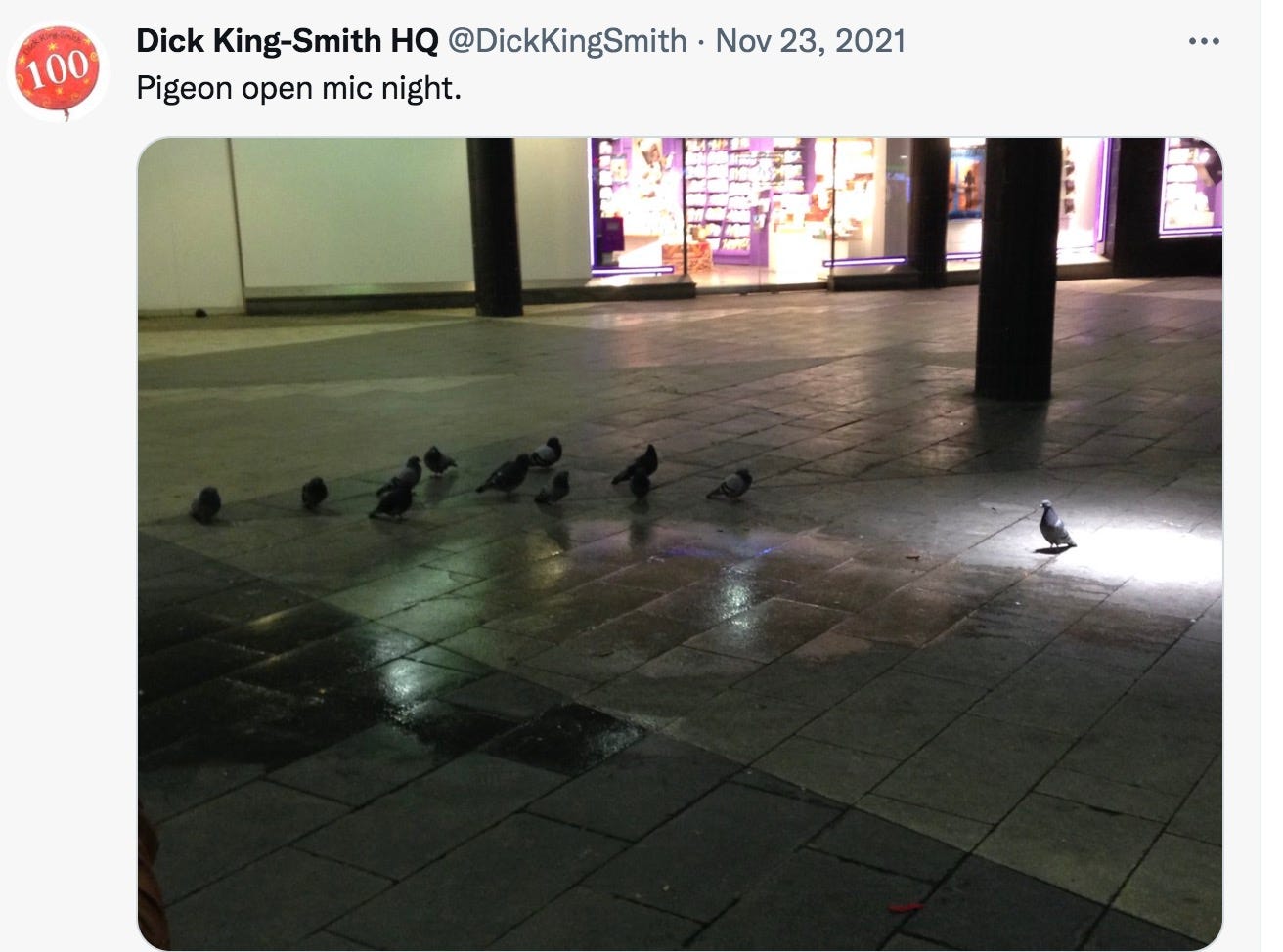Straight talk from a critic on the term 'straight'
...& a celebration of expeditious replays in football
To read this issue in your browser, click on the headline above.
Eric Zorn is a former opinion columnist for the Chicago Tribune. Find a longer bio and contact information here. This issue exceeds in size the maximum length for a standard email. To read the entire issue in your browser, click on the headline link above. Become a paid subscriber to receive each Picayune Plus in your email each Tuesday.
Expedited at last! The NFL is finally starting to get it right with replay
…Now about that time-wasting first-down-measurement charade…
A tip of the semi-protective helmet to the National Football League for this year finally figuring out that in most cases, the pomp and circumstance surrounding replay review is unnecessary. Viewers at home have long been able to see almost immediately when the officials have either blown a close call — 40% of the time, according to a league report — or gotten it right, yet for years the NFL went through variations of a making a show of the officials conferring, dithering, watching the video and so on. The average review lasted 2:23 in 2021.
You may have heard the term “expedited review” this season to explain why so many calls are being quickly overturned or upheld, moving the game along without excessive replay theater. It only took the NFL 37 years to get it right.
Now to get rid of “the chains” as a way of measuring for a first down. Sideline Laser technology is more than able to make a very quick decision about whether a team has advanced the ball the requisite 10 yards for a first down, so there is never any real need for the tedious measurement ritual in which the chain gang enters the field and checks.
(And speaking of first downs, a team’s statistical success on 3rd down and 4th down, a number announcers are always providing, isn’t very telling unless you know what their average success rate is from, say, 3 yards, 5 yards, 10 yards and so on.)
Major League Baseball should get a clue from the NFL and dramatically speed up its replay review process as well. Use pagers or cellular technology to communicate quickly with the umpires. Their game is slow enough as it is.
Notes and comments from readers —lightly edited —- along with my responses
Joanie W. — Regarding Stanford’s list of “harmful” words to be avoided about which you and so many others have been critical, I agree with advice to avoid the term “straight” to mean heterosexual. Such use suggests that those of us who aren’t heterosexual are crooked or immoral. I think the etymology of the use of the word “straight” to mean heterosexual would reflect that. One of the definitions of “straight” is “upright.” In the Boy Scout oath, Boy Scouts are taught to pledge to do their best to keep themselves “morally straight.” Does that mean that those of us who aren’t heterosexual are morally crooked? Now, I don’t freak out when people use the term “straight” to mean heterosexual. I just figure the speaker is probably a clueless heterosexual, unaware of the offensive nature of that use of the word.
See “Don’t say ‘straight’ when you mean ‘heterosexual’ – Schools, homophobia and why language matters.” (Teachwire) and “De-Normalizing Heteros: Why I Don’t Use the Word ‘Straight’” (BGD)
There is some validity to both sides in the “cancel culture” debate. The opponents of “cancel culture” tend to feel that policing their language to make it less offensive to marginalized communities is an unnecessary restriction on their “freedom.” And the folks on the other side tend to favor draconian penalties for the use of language which was acceptable during our lifetimes
The BGD article cites Wikipedia that “The term straight originated as a mid-20th century gay slang term for heterosexuals, ultimately coming from the phrase “to go straight” (as in “straight and narrow”), or stop engaging in homosexual sex. One of the first uses of the word in this way was in 1941 by author G. W. Henry. Henry’s book concerned conversations with homosexual males and used this term in connection with people who are identified as ex-gays.”
It does not quote the next sentence, “It is now simply a colloquial term for ‘heterosexual,’ having changed in primary meaning over time,” adding then that some object to the term “because it implies that non-heteros are crooked.”
The connotation today is of conventionality, predictability and adherence to traditional societal norms of gendered attraction. And I know from your follow-up comment that you object to the implication that homosexuality is outside the norm, but observing that it’s not statistically common — not a default assumption — is not necessarily any more or less invideous than saying it’s unusual or atypical. Gallup finds that about 7% of the population identify as lesbian, gay, bisexual, transgender.
About 10% are predominantly left handed. But to say right handedness is the norm is not to say there is anything wrong with lefties.
That said, preserving “straight” as a colloquial term for heterosexuals isn’t a hill I’d be willing to die on. But given that it remains in common among gay people, I’ll wait for greater evidence that objections to it aren’t just umbrage hunting.
Steven K. — Yet again, the ludicrous notion that to see, hear, or read something that offends is to sustain actual “harm” reappears. This patently false and utterly asinine idea seems to have spread to all corners of our culture, but clearly, college students have a particular susceptibility to it. The irony is that the people that promote all of this nonsense say they are “progressive”. To believe that a word cannot be spoken lest it anger the gods is anything but progress.
I actually don’t object to people making the case against particular words and phrases and I’m generally willing to adapt when I come to believe that certain usages cause people distress. But before I change I do ask for some evidence of consensus — so we don’t have such terms as Latinx foisted on us when studies show the majority of Hispanic people don’t like it — and I also ask that more grace and tolerance be shown to those who are slow to adapt.
It’s the harshly punitive impulse that distresses me, not the disagreements or the often over-fussy reading of insults into once acceptable terms.
Pete P. — Saying someone or something “sucks” is problematic. It clearly derives from anti-gay and possibly misogynistic attitudes. It comes from “cocksucker,” an old insult aimed at men only, equating them with homosexuals.
In 2006, Seth Stevenson at Slate posted “Suck It Up. A defense of the much-maligned word.”
It’s impossible to intelligently maintain that sucks is still offensive. The word is now completely divorced from any past reference it may have made to a certain sex act. .. Such obsessing is silly. When someone says Bill Gates is a geek, do you picture him as a circus performer biting the head off a live chicken? Of course not. The word’s root meaning has been replaced with a new connotation. Similarly, when I call Paris Hilton a moron, I don’t mean she’s mentally retarded, and when I call bungee jumping lame I don’t mean it’s disabled. What once was offensive is now simply abrasive. Language moves on, and the sucks-haters are living in the past.
Besides, it’s not even clear that sucks has naughty origins. We might trace its roots to the phrase sucks hind teat, meaning inferior. Or there’s sucks to you, a nonsexual taunt apparently favored by British schoolchildren of yore. Of course, when a 9-year-old girl walks up to you tomorrow and tells you that “Blue’s Clues sucks,” she won’t be aware of these past usages. But neither will she have in mind (or understand) the much dirtier alternative. The point is that sucks has become untethered from its past and carries no tawdry implications for those who use it.
This gets to the trick-box of usage. If a term once had offensive connotations but really no longer does — “straight,” for instance, or “sucks” — some will argue that it’s still verboten. And if a term was once totally mainstream and acceptable but has been tarnished by time — “retarded” for instance — it, too is verboten.
Mark G. — Though I have for some time preferred “ended one’s own life” to “committed suicide,” I remain ignorant of how/why the latter term is offensive.
The idea is that suicide is often caused by severe mental illness so that to say someone “committed” suicide is to give the victim of, say, extreme depression, agency that they don’t have. You wouldn’t say someone “committed cancer” or “committed a heart attack.” That’s the thinking, as I understand it.
Nancy M. — Thank you for linking on Thursday to the Chicago Magazine article, "Following Steve Goodman's Morning Train to Mattoon." Coincidentally, a couple of weeks ago I had begun studying my spiral-bound songbook “Rise Up Singing” in order to memorize the lyrics to "City of New Orleans" for the purpose of belting it out accurately in the shower. Thus my attention was arrested by Chicago magazine's contention that part of one verse goes:
And the sons of Pullman porters
And the sons of engineers
Ride their father’s magic carpets made of steel
Mothers with their babes asleep
Are rockin’ to the gentle beat
And the rhythm of the rails is all they feelBut the songbook renders that verse:
And the sons of Pullman porters
And the sons of engineers
Ride their father’s magic carpets made of steam
Mothers with their babes asleep
Are rockin’ to the gentle beat
And the rhythm of the rails is all they dream.
Can you arbitrate which version is official, so I henceforth can serenade my dogs with confidence?
Yes, I can! Though I do not recommend showering with dogs. Steve Goodman’s original lyrics were “…steam” and “dream,” though the City of New Orleans train was always diesel powered. Arlo Guthrie, who made the song famous, and John Denver, who exposed it to a still wider audience, sang “steel” and “feel,” which I, personally, consider an improvement. Babies don’t dream of rhythm. I will be taking no questions at this time.
Bruce M. — I enjoy listening to you and other panelists on “The Mincing Rascals” podcast, and I was sad to read your report that Heather Cherone of WTTW-Ch. 11 will no longer be on. Heather was great. I hope you can replace her with another female voice and with her breadth of political knowledge.
I’m sad too! I love both Heather’s nerdiness and her passion. It was a treat to talk to her most weeks for many years. We parted on excellent terms — she’s going to be a fellow at the University of Chicago’s Institute of Politics while keeping her job covering local politics and government for WTTW, so she just didn’t have time to continue. And though she’s irreplaceable, we do feel the need to try to replace her.
Glen M. — Very disappointed that you would go on such a long rant against John Kass. Your bizarre and twisted attacks only reveal your petty jealousy.
What was bizarre, twisted or in the least bit false about "Setting the record straight on John Kass, George Soros and the Chicago Tribune Guild," an item from last March that you evidently just got around to reading? I thought I laid out very clearly how my unjustifiably embittered former colleague misrepresented the truth in his bizarre and twisted vendetta against the Tribune, a newspaper that coddled him for decades. I am open to your factual corrections, as John himself has not volunteered any.
Edward M . — I am a paying subscriber to the Picayune Sentinel. But I don’t want to be part of the automatic subscription renewal program. Can you help?
Yes! First, I understand and I sympathize. Automatic renewals are designed to take advantage of human inertia and inattentiveness. At the very least, every publication ought to allow subscribers easily to opt out of automatic renewals at the time they order their subscriptions. Substack does not, but it does claim to send out reminder emails when your subscription is about to renew so you can stop the renewal. Which is at least transparent.
There is a workaround: Since gift subscriptions do not automatically renew, you can simply order yourself a gift subscription. I present this option in good faith a while hoping that most people do continue to renew.
A salute to the vanishing vacuum tube generation
Former WBEZ-FM 91.5 program director Ken Davis posted to Facebook the following tribute to the departing radio engineers of yore, the valiant and unsung heroes of the broadcasting industry:
Joe DiFranco (1928-2021), Bill Meyers (1933-2012). Now Al Mix (1940-2023). They’ve been front and center in my thoughts today, and in several conversations.
They were part of that now-mostly vanished generation of Americans who came up as vacuum-tubes ruled the world.
And in their lifetimes they had to completely re-learn everything as transistors and solid-state re-made their universe.
Then, not 20 years later, as they neared the end of their careers, they had to somehow figure out digital.
One thing all this change taught them was that sometimes you just have to reach for the zip cord when you can't afford that CAT 5e computer cable, metaphorically speaking.
And so much of the time they pulled it off.
Their generation knew how to make things work, and you didn’t always have to have the biggest, flashiest, hottest new equipment with which to do it.
For most of their tenure at WBEZ, they were working with practically no budget at all. And younger punks like us were arriving and demanding more and more capability as we tried to build a competitive radio station.
I ended up sometimes in an adversary position with engineering, because we needed field equipment for our burgeoning news department, and studio capacity for the live presentation of news and discussion programming. Through our lens, they always seemed to be slowing us down.
But time changes perspective.
They worked like dogs to get us what we wanted, even though it took time, and equipment didn’t always work as well as we all wished. But the station in those days had no money, and we were so lucky to have them. Those guys made a critical, but rarely acknowledged, contribution to the early successes of the modern WBEZ.
I’ll never forget the hundreds of hours they spent wiring the broadcast trailers for scores of live presentations of the Jazz, Blues and Gospel festivals. And live originations from City Hall, the Old Town School and countless others. All of it years before cellular tech made live broadcasts commonplace.
Those Korean War vets served the station for decades, ending up wiring, and building, a huge part of the new facilities at Navy Pier. We all owe them a sincere debt of gratitude. Thanks Joe, thanks Bill, and now, thank you Al.
—Ken Davis, reprinted with permission.
Former WBEZ on-air talent Greg King added this comment on Facebook: “They were solid as a rock, those guys. They made it so all I had to do was flip a switch and suddenly I could speak to (hopefully) thousands of listeners. I didn’t have to worry about how it all worked — it just worked, thanks to these guys.”
Allen L. Mix of Poplar Grove died on January 9. Visitation will be Tuesday from 5-8 p.m. at the Anderson Funeral Home, 218 Hurlbut Ave., Belvidere. Funeral services will be held Wednesday at 10 a.m. at Jefferson Prairie Lutheran Church, 23184 Bergen Rd., Poplar Grove.
Joseph DeFranco obituary. And William E. Meyers Jr. obituary.
Ya gotta see these tweets!
I often run across tweets that rely on visual humor and so can’t be included in the Tweet of the Week contest (the template I use for that poll does not allow me to include images). Here are a few good ones I’ve come across recently:
Vote for your favorite. I’ll share the winner in Thursday’s main edition.
There’s still time to vote in the conventional Tweet of the Week poll!
Thank you for supporting the Picayune Sentinel. To help this publication grow, please consider spreading the word to friends, family, associates, neighbors and agreeable strangers.
.
















I thought all of the visual tweets were hilarious!! Keep it up!!
Thanks for reprinting the sweet tribute to the radio engineers. It's a reminder that in any industry the unsung heroes often are invisible to the public-facing audience or end-user. I worked in print publishing for 21 years and electronic publishing for 19, and while the success of the content and layout and user-friendly functionality were attributed to those of us listed in the masthead or byline, none of it would have happened without the talent and long hours of the "vacuum tube generation" (press operators and color-separators and others) back in the day and, more recently, the code developers and network engineers. I was lucky enough to work with 40-years' worth of incredibly dedicated people behind the scenes who made all of us public-facing folks look great.